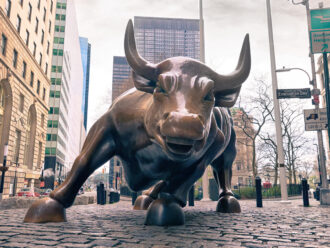How has Covid affected responsible investors? Mark Dunne spoke to five asset owners to find out.
Asset owners’ commitment to responsible investing and the effectiveness of such strategies are being tested like never before. Banking crises, stock market crashes and recessions have all happened since responsible investing’s popularity started growing across the institutional investment industry, but it has faced nothing like Covid.
People becoming prisoners in their own homes to avoid the virus led to the UK economy contracting by a fifth in the space of a month. A lower than expected recovery and record rise in redundancies are further evidence that these are unprecedented times.
Will asset owners ease the pressure on their portfolio companies to adopt sustainable practices during tough economic times, or is responsible investing needed now more than ever before?
We brought five asset owners together to discuss the impact that the pandemic is having on their responsible investment strategies.
Covid-19: Everything’s changed
Consensus points to tough times ahead of us with unemployment rising as restaurants, pubs and entertainment venues have been hit hard by the pandemic. So this recession is different from the last one and begs the question, how will those investing responsibly perform in such a difficult economic environment?
Danyal Sattar, chief executive of direct social impact investor Big Issue Invest, points out that the UK has not endured a high unemployment recession for decades, noting that the gig economy and workers sacrificing pay rises helped avert one during the 2008 financial crisis. “So, we are coming into tough times,” he says. “The charity and social enterprise sector is extraordinary resilient. They tend to go bust less than other small to medium-sized enterprises.
“Our portfolios are performing reasonably at the moment. About 10% of our small loan portfolio is off schedule in terms of repayment and we have not had any failures on the larger investment side. So, I would not be surprised if we are underperforming in terms of business failure because of the extraordinary resilience of the charity sector. It is pretty grim out there, but I suspect that we are not the worst hit.”
Aaron Pinnock, an impact investment analyst for the Church of England, says that the impact investment scene has grown in the past five to 10 years. “We are looking to use our money to enhance real world outcomes for society and the environment.
The bulk of our attention in the impact space is on climate but, being a faith-based investor, social outcomes are important to us. We see climate change as the number one priority because of the systemic impact it has on our portfolio.”
Climate change also features heavily in Brunel Pension Partnership’s discussions with its portfolio companies given the impact it has and the inter-connectively to biodiversity and water stress, says Helen Price, a stewardship manager for the pool.
“Some of the other topics we are discussing are around diversity following the Black Lives Matter protests we have seen globally and the impact it is having on certain areas of society,” she says.
Price adds that Brunel is looking at all areas of diversity. “We have been discussing with asset owners and managers on how they are looking at ethnic diversity and integrating that better going forward.
“We have acknowledged that some of the focus in the past has been on gender. Where the discussions have been more difficult it has perhaps been avoided. So, we have highlighted that we would like to see better efforts in terms of ethnic diversity going forward.”
The social pillar of ESG has also been on the agenda for the pool. “It has been an area where it has been difficult to engage on as there has been a lack of data,” Price says.
Brunel has joined the Workforce Disclosure Initiative, which is seeking to provide information to investors to assess how companies are handling this area of risk and looking after their staff.
“The employees have been the hardest hit during the pandemic,” Price says. “The social issues are the ones that are emerging as topics that asset owners and investors are starting to discuss more with companies going forward.”
Performance
How ethical, responsible investing (RI) and ESG strategies perform is a question that managers have had to answer many times. Institutional investors must make a financial return, either to pay pensions or to re-invest in good causes. It’s why they exist.
The Esmée Fairbairn Foundation has seen the value of its investments rise this year, despite the economic conditions.
“Bizarrely, our portfolios are at a higher level than they were on 1 January,” says investment director Matthew Cox. “It does not make sense when you look at the deterioration in the real economy.”
This he puts down to screening biases when picking sustainable stocks. “Huge tech stocks dominating the S&P are disguising what is going on with headline indices,” he adds. “When you construct a responsible investment or ESG-focused portfolio there is a danger that you end up overweight in healthcare and technology, because they are sectors that often screen well in terms of long-term sustainability.
“Although, tech companies might have issues on the social side of ESG they are at the forefront of the E as they fund their business with renewable energy and use artificial intelligence (AI) to be more efficient.
“So, RI funds were doing well before Covid because of their exposure to quality sectors,” Cox says. “They are doing well now because of the resilience of those two sectors.”
Local Pensions Partnership also reports an outperformance in its responsible investments this year. Chief investment officer Richard Tomlinson says that the quality businesses that an RI assessment can uncover is key.
“We do not track RI in our portfolio,” he says. “The businesses that have high RI weightings tend to be the businesses we like because we invest in quality companies that have sustainable cash-flows and a sustainable competitive position for the long-term. So, we have seen some outperformance. “My personal belief is that these RI characteristics are going to drive longer-term performance,” he adds.
Tomlinson points to the social contract that every enterprise has with society, which is evolving and that RI is at the core of it. “Covid has accelerated that transition where significant sectors and businesses are different to where they were six months ago,” he says. “They are relying ever more on government and societal support, the idea of the Pret economy and getting people back into London, all this type of stuff.
“The interaction between society, government and corporate enterprises has become ever tighter. It means that RI has come to the fore. “Companies well aligned to that future state are part of what has driven performance over the past six months,” Tomlinson adds. “It is a long-winded way of saying that there has been an outperformance of RI strategies and there is a sensible reasoning for that.
“It is pricing in where the world is going to be in the next five or 10 years and these things are becoming more important and have been accelerated by Covid,” he says.
Making a difference
It is almost universally accepted that once the virus is consigned to the history books, life will not return to the normality we experienced at the start of 2020. So, how will social impact investing change post-Covid?
Sattar says this crisis could show people what is truly important. “A hospice is not a discretionary purchase. Elder care when you are old is not a discretionary purchase. Aftercare is not a discretionary purchase. We are beginning to see what is important when you face crises in your life. The social issues that seem fluffy and woolly become the hard ones when you are up against them.”
He compares the importance of these issues to the issues making the headlines such as how the high street is changing. “Relative to hard social issues, there is something of what is real that we are beginning to see.
“The world that we live in is one that we made up,” Sattar says. “It was observed in the last financial crisis that the economy is based on confidence. We have agreed that a lot of stuff we think is real is actually vulnerable or transitory.”
Sattar uses the River Thames as an example. “The fast-flowing, grey murky river should be sitting in a wide floodplain, should be clear blue water and we should be able to see green reeds at the bottom of it.
“So much of what we believe is the world we live in and how it is structured is increasable transitory,” he says.
“The global financial crisis and this pandemic are big wake up calls for anyone of us who think that the world is a safe, structured place. It gets pretty wild at times. “Along with climate change, these are hard issues that we have to tackle,” he adds.
Staying responsible
From what we have heard in the discussion so far, these asset owners are unlikely to ditch their RI strategies, despite the economic conditions. In fact, these challenges could create opportunity for responsible investors, if they know where to look.
“COP-26 has been delayed until next year,” Price says. “That presents an opportunity for us to learn from what is happening. At the moment, there are supply chain issues that companies are facing. It is almost a vindication of risk factors that could come if they do not deal with climate change.
“We will not see companies pulling away from the objectives and strategies that they have set,” she says, pointing to Unilever as one company that has in the past few weeks announced its commitment to their long term and interim targets.
“Part of the challenge is not if companies are pulling away from the targets they have set, it is if they go far enough in dealing with the risks and opportunities that they face and, again, look under the bonnet to analyse if what they have announced is meaningful or are they paying lip service.
“In the long term, companies are realising that if they do not deal with these risks it will hit their bottom line and their sustainability. “Just because we are in a pandemic does not mean that climate change has disappeared,” Price adds. “It is still a real risk that we are facing and we need to deal with that problem and implement the tools to make companies as sustainable as possible.”
Build back better
The destruction caused by the pandemic means that a major rebuilding plan is needed to re-boot the UK economy. “Build back better” has become a mantra for the government in this area, but build back greener has elbowed its way into the debate to ensure that the environmental and social aspects are part of any rebuild plan and that the mistakes of the past are not repeated.
These mistakes include the missed opportunity following 2008’s financial crisis for a green stimulus package. “Now there is the opportunity for green stimulus packages with attached caveats,” Pinnock says. “There is the whole build back better movement,” he adds. “That is a role that investors can take in signing up to these things and pushing government to enact the right policy.”
Sattar is clear on the approach he would take to ensure that the missed opportunity of 2008 is not repeated. “In the debates we are having about state aid, the worry is clear that if the government believes it can pick winners in certain sectors of the economy then that would be a bad way of thinking about it.
“If you are going to stimulate the economy it makes huge sense to get the hundreds of thousands of smaller builders doing energy efficiency and things that are relatively cheap in terms of climate change impact,” he adds. “There are sensible ways of delivering job creation and economic growth through a green economy. We absolutely should be doing that.”
Pinnock adds that there is still no shortage of capital looking to go to climate or social solution investments, as long as assets are priced correctly. “At the moment, externalities, whether they be positive or negative, are not priced appropriately. Investors are almost being forced to make inadequate investment decisions because externalities are not appropriately priced and they can only be appropriately priced by government.”
What happens next?
Our panel are optimistic that post-Covid responsible investing will continue to be a priority for institutional investors. The only impact from the pandemic and the resulting recession is that its importance will grow.
“Post virus, it will be more of the same,” Tomlinson says, adding that there could be the potential for an acceleration in the next 10 years. “Covid is ratcheting up the views on many of these RI factors in peoples’ minds and it will stay there. The acceleration has been a step change and will continue to creep up through the next decade or two.
“I would frame these as cycles,” he adds. “We are moving through a series of political cycles. You can trace the behaviours back to the baby boomers who are in power now. When you see the younger generation, born post 1980 and where these beliefs are native, coming into political power, you will see another acceleration of change.”
Far from damaging the progression of responsible investing, Sattar believes that recessions increase interest in investing to benefit society and the environment.
“I would expect to see an increase in interest in responsible investment out of this pandemic. “Generally, it seems to me that every time there is a recession there has been an upsurge of interest in responsible investing,” he adds.
“People want to do something but what can they do during a big economic crisis? Moving their money, their pension, their savings into doing something positive is an action that people can take.”
The themes Price expects to see emerge post-Covid include continued scrutiny over executive pay, particularly where companies have furloughed or released staff.
She also believes that we could see a focus on tax with the shift of companies to online and should those which operate “precarious tax practices” receive government support and pay it back if they have.
The interesting point about responsible investing is that the worse the economic environment, the more it is needed as an investment strategy.
“We are moving in the right direction in terms of responsible investing because we must,” Sattar says. “It is an existential need to be responsible in our investment.”




